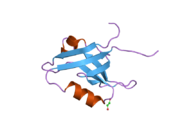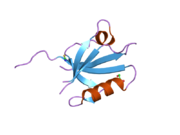Biology:Sodium-hydrogen exchange regulatory cofactor 2
 Generic protein structure example |
Sodium-hydrogen exchange regulatory cofactor NHE-RF2 (NHERF-2) also known as tyrosine kinase activator protein 1 (TKA-1) or SRY-interacting protein 1 (SIP-1) is a protein that in humans is encoded by the SLC9A3R2 (solute carrier family 9 isoform A3 regulatory factor 2) gene.[1][2]
NHERF-2 is a scaffold protein that connects plasma membrane proteins with members of the ezrin/moesin/radixin family and thereby helps to link them to the actin cytoskeleton and to regulate their surface expression. It is necessary for cAMP-mediated phosphorylation and inhibition of SLC9A3. In addition, it may also act as scaffold protein in the nucleus.
Function
This regulatory protein (factor) interacts with a sodium/hydrogen exchanger NHE3 (SLC9A3) in the brush border membrane of the proximal tubule, small intestine, and colon that plays a major role in transepithelial sodium absorption. SLC9A3R2, as well as SLC9A3R1 and protein kinase A phosphorylation, may play a role in NHE3 regulation.[3]
Interactions
Sodium-hydrogen exchange regulatory cofactor 2 has been shown to interact with SGK,[4][5] Actinin alpha 4,[6] Parathyroid hormone receptor 1,[7] Phosphoinositide-dependent kinase-1,[4] EZR,[8][9] PODXL,[10][11][12] Cystic fibrosis transmembrane conductance regulator[13] and PLCB3.[14]
See also
References
- ↑ "The human testis determining factor SRY binds a nuclear factor containing PDZ protein interaction domains". J. Biol. Chem. 272 (11): 7167–72. March 1997. doi:10.1074/jbc.272.11.7167. PMID 9054412.
- ↑ "A C-terminal motif found in the beta2-adrenergic receptor, P2Y1 receptor and cystic fibrosis transmembrane conductance regulator determines binding to the Na+/H+ exchanger regulatory factor family of PDZ proteins". Proc. Natl. Acad. Sci. U.S.A. 95 (15): 8496–501. July 1998. doi:10.1073/pnas.95.15.8496. PMID 9671706. Bibcode: 1998PNAS...95.8496H.
- ↑ "Entrez Gene: SLC9A3R2 solute carrier family 9 (sodium/hydrogen exchanger), member 3 regulator 2". https://www.ncbi.nlm.nih.gov/sites/entrez?Db=gene&Cmd=ShowDetailView&TermToSearch=9351.
- ↑ 4.0 4.1 Chun, Jaesun; Kwon Taegun; Lee Eunjung; Suh Pann-Ghill; Choi Eui-Ju; Sun Kang Sang (October 2002). "The Na(+)/H(+) exchanger regulatory factor 2 mediates phosphorylation of serum- and glucocorticoid-induced protein kinase 1 by 3-phosphoinositide-dependent protein kinase 1". Biochem. Biophys. Res. Commun. (United States) 298 (2): 207–15. doi:10.1016/S0006-291X(02)02428-2. ISSN 0006-291X. PMID 12387817.
- ↑ Yun, C Chris; Chen Yueping; Lang Florian (March 2002). "Glucocorticoid activation of Na(+)/H(+) exchanger isoform 3 revisited. The roles of SGK1 and NHERF2". J. Biol. Chem. (United States) 277 (10): 7676–83. doi:10.1074/jbc.M107768200. ISSN 0021-9258. PMID 11751930.
- ↑ "Ca(2+)-dependent inhibition of Na+/H+ exchanger 3 (NHE3) requires an NHE3-E3KARP-alpha-actinin-4 complex for oligomerization and endocytosis". J. Biol. Chem. (United States) 277 (26): 23714–24. June 2002. doi:10.1074/jbc.M200835200. ISSN 0021-9258. PMID 11948184.
- ↑ Mahon, Matthew J; Donowitz Mark; Yun C Chris; Segre Gino V (June 2002). "Na(+)/H(+ ) exchanger regulatory factor 2 directs parathyroid hormone 1 receptor signalling". Nature (England) 417 (6891): 858–61. doi:10.1038/nature00816. ISSN 0028-0836. PMID 12075354. Bibcode: 2002Natur.417..858M.
- ↑ Yun, C H; Lamprecht G; Forster D V; Sidor A (October 1998). "NHE3 kinase A regulatory protein E3KARP binds the epithelial brush border Na+/H+ exchanger NHE3 and the cytoskeletal protein ezrin". J. Biol. Chem. (UNITED STATES) 273 (40): 25856–63. doi:10.1074/jbc.273.40.25856. ISSN 0021-9258. PMID 9748260.
- ↑ Sitaraman, Shanthi V; Wang Lixin; Wong Michelle; Bruewer Matthias; Hobert Michael; Yun C-H; Merlin Didier; Madara James L (September 2002). "The adenosine 2b receptor is recruited to the plasma membrane and associates with E3KARP and Ezrin upon agonist stimulation". J. Biol. Chem. (United States) 277 (36): 33188–95. doi:10.1074/jbc.M202522200. ISSN 0021-9258. PMID 12080047.
- ↑ Meder, Doris; Shevchenko Anna; Simons Kai; Füllekrug Joachim (January 2005). "Gp135/podocalyxin and NHERF-2 participate in the formation of a preapical domain during polarization of MDCK cells". J. Cell Biol. (United States) 168 (2): 303–13. doi:10.1083/jcb.200407072. ISSN 0021-9525. PMID 15642748.
- ↑ Takeda, T; McQuistan T; Orlando R A; Farquhar M G (July 2001). "Loss of glomerular foot processes is associated with uncoupling of podocalyxin from the actin cytoskeleton". J. Clin. Invest. (United States) 108 (2): 289–301. doi:10.1172/JCI12539. ISSN 0021-9738. PMID 11457882.
- ↑ Li, Yong; Li Jian; Straight Samuel W; Kershaw David B (June 2002). "PDZ domain-mediated interaction of rabbit podocalyxin and Na(+)/H(+) exchange regulatory factor-2". Am. J. Physiol. Renal Physiol. (United States) 282 (6): F1129–39. doi:10.1152/ajprenal.00131.2001. ISSN 0363-6127. PMID 11997330.
- ↑ Sun, F; Hug M J; Lewarchik C M; Yun C H; Bradbury N A; Frizzell R A (September 2000). "E3KARP mediates the association of ezrin and protein kinase A with the cystic fibrosis transmembrane conductance regulator in airway cells". J. Biol. Chem. (UNITED STATES) 275 (38): 29539–46. doi:10.1074/jbc.M004961200. ISSN 0021-9258. PMID 10893422.
- ↑ Hwang, J I; Heo K; Shin K J; Kim E; Yun C; Ryu S H; Shin H S; Suh P G (June 2000). "Regulation of phospholipase C-beta 3 activity by Na+/H+ exchanger regulatory factor 2". J. Biol. Chem. (UNITED STATES) 275 (22): 16632–7. doi:10.1074/jbc.M001410200. ISSN 0021-9258. PMID 10748023.
Further reading
- "cAMP-mediated inhibition of the epithelial brush border Na+/H+ exchanger, NHE3, requires an associated regulatory protein.". Proc. Natl. Acad. Sci. U.S.A. 94 (7): 3010–5. 1997. doi:10.1073/pnas.94.7.3010. PMID 9096337. Bibcode: 1997PNAS...94.3010Y.
- "Identification of EBP50: A PDZ-containing phosphoprotein that associates with members of the ezrin-radixin-moesin family.". J. Cell Biol. 139 (1): 169–79. 1998. doi:10.1083/jcb.139.1.169. PMID 9314537.
- "NHE3 kinase A regulatory protein E3KARP binds the epithelial brush border Na+/H+ exchanger NHE3 and the cytoskeletal protein ezrin.". J. Biol. Chem. 273 (40): 25856–63. 1998. doi:10.1074/jbc.273.40.25856. PMID 9748260.
- "Genomic structure and sequence of a human homologue (NTHL1/NTH1) of Escherichia coli endonuclease III with those of the adjacent parts of TSC2 and SLC9A3R2 genes.". Gene 222 (2): 287–95. 1999. doi:10.1016/S0378-1119(98)00485-5. PMID 9831664.
- "cAMP-induced phosphorylation and inhibition of Na(+)/H(+) exchanger 3 (NHE3) are dependent on the presence but not the phosphorylation of NHE regulatory factor.". J. Biol. Chem. 274 (35): 24753–8. 1999. doi:10.1074/jbc.274.35.24753. PMID 10455146.
- "Regulation of phospholipase C-beta 3 activity by Na+/H+ exchanger regulatory factor 2.". J. Biol. Chem. 275 (22): 16632–7. 2000. doi:10.1074/jbc.M001410200. PMID 10748023.
- "E3KARP mediates the association of ezrin and protein kinase A with the cystic fibrosis transmembrane conductance regulator in airway cells.". J. Biol. Chem. 275 (38): 29539–46. 2000. doi:10.1074/jbc.M004961200. PMID 10893422.
- "TAZ: a novel transcriptional co-activator regulated by interactions with 14-3-3 and PDZ domain proteins.". EMBO J. 19 (24): 6778–91. 2001. doi:10.1093/emboj/19.24.6778. PMID 11118213.
- "Identification of EPI64, a TBC/rabGAP domain-containing microvillar protein that binds to the first PDZ domain of EBP50 and E3KARP.". J. Cell Biol. 153 (1): 191–206. 2001. doi:10.1083/jcb.153.1.191. PMID 11285285.
- "Loss of glomerular foot processes is associated with uncoupling of podocalyxin from the actin cytoskeleton.". J. Clin. Invest. 108 (2): 289–301. 2001. doi:10.1172/JCI12539. PMID 11457882.
- "Glucocorticoid activation of Na(+)/H(+) exchanger isoform 3 revisited. The roles of SGK1 and NHERF2.". J. Biol. Chem. 277 (10): 7676–83. 2002. doi:10.1074/jbc.M107768200. PMID 11751930.
- "Plasma membrane Ca2+ ATPase isoform 2b interacts preferentially with Na+/H+ exchanger regulatory factor 2 in apical plasma membranes.". J. Biol. Chem. 277 (12): 10506–11. 2002. doi:10.1074/jbc.M111616200. PMID 11786550.
- "Distinct cell type-specific expression of scaffolding proteins EBP50 and E3KARP: EBP50 is generally expressed with ezrin in specific epithelia, whereas E3KARP is not.". Eur. J. Cell Biol. 81 (2): 61–8. 2002. doi:10.1078/0171-9335-00218. PMID 11893083.
- "Ca(2+)-dependent inhibition of Na+/H+ exchanger 3 (NHE3) requires an NHE3-E3KARP-alpha-actinin-4 complex for oligomerization and endocytosis.". J. Biol. Chem. 277 (26): 23714–24. 2002. doi:10.1074/jbc.M200835200. PMID 11948184.
- "PDZ domain-mediated interaction of rabbit podocalyxin and Na(+)/H(+) exchange regulatory factor-2.". Am. J. Physiol. Renal Physiol. 282 (6): F1129–39. 2002. doi:10.1152/ajprenal.00131.2001. PMID 11997330.
- "Na(+)/H(+ ) exchanger regulatory factor 2 directs parathyroid hormone 1 receptor signalling.". Nature 417 (6891): 858–61. 2002. doi:10.1038/nature00816. PMID 12075354. Bibcode: 2002Natur.417..858M.
- "The adenosine 2b receptor is recruited to the plasma membrane and associates with E3KARP and Ezrin upon agonist stimulation.". J. Biol. Chem. 277 (36): 33188–95. 2002. doi:10.1074/jbc.M202522200. PMID 12080047.
- "The down regulated in adenoma (dra) gene product binds to the second PDZ domain of the NHE3 kinase A regulatory protein (E3KARP), potentially linking intestinal Cl-/HCO3- exchange to Na+/H+ exchange.". Biochemistry 41 (41): 12336–42. 2002. doi:10.1021/bi0259103. PMID 12369822.
External links
- Overview of all the structural information available in the PDB for UniProt: Q15599 (Na(+)/H(+) exchange regulatory cofactor NHE-RF2) at the PDBe-KB.
This article incorporates text from the United States National Library of Medicine, which is in the public domain.
 |



